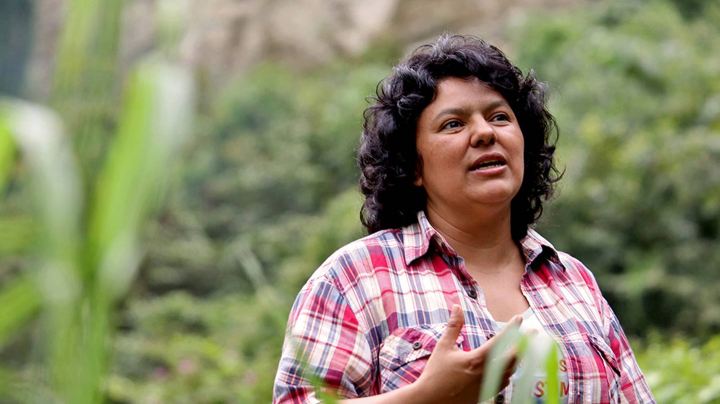7 Men Sentenced to Prison for Murder of Honduran Environmental Activist Berta Cáceres

Photo courtesy of the Goldman Environmental Prize
On Monday, the seven men who were found guilty of killing Honduran environmental justice activist Berta Cáceres were sentenced to 30 to 50 years behind bars.
Cáceres, who was fighting against the construction of a hydroelectric dam on Lenca Indigenous land when she was attacked, was fatally shot at her home on March 2, 2016.
In November 2018, a Honduran court ruled that Cáceres’s killing was ordered by executives of the company behind the dam, widely known as DESA, because of the impact her protests had on the company, including delays to the project and financial losses.
The activism of Cáceres, who began organizing against the construction of the $50 million dam in 2006, led to the project being suspended after it was one-fifth completed.
This week, the seven men who were found guilty last year for the activist’s murder were sentenced. According to the Guardian, the four paid hitmen — Elvin Rapalo, Edilson Duarte Meza, Óscar Torres and Henry Javier Hernández — were each handed 34-year terms for the killing. Each of them was also given an additional 16 years and four months of jail time for the attempted murder of Gustavo Castro, a Mexican environmentalist who was shot in the same attack but survived.
Three other men — including Sergio Ramón Rodríguez, the communities and environment manager for Desa; Douglas Geovanny Bustillo, a former Desa security chief and ex-U.S. trained army lieutenant; and Mariano Díaz Chávez, a U.S.-trained special forces major who served alongside Bustillo, were given 30 years for their part in the murder.
While Cáceres’s family and supporters were pleased with the sentences, they called the moment “a day of pain” and also expressed that justice won’t be fully served until everyone involved in the late activist’s murder are held accountable.
“From the outset, the path to justice has been painful, as our rights as victims have not been respected. These sentences are a start in breaking the impunity, but we’re going to make every effort to ensure that all those responsible – the company executives and state officials identified in the trial – are prosecuted,” Bertita Zúñiga, Cáceres’ daughter, said, according to the British daily newspaper.
The murder of Cáceres, the recipient of the Goldman prize for environmental defenders, caused international outrage and brought global attention to the killings of environmental activists. According to Democracy Now, Honduras is one of the most dangerous countries in the world for land protectors, with at least 24 environmental leaders killed since March 2015.
However, across the globe, people who stand up against capitalism and defend lands experience similar attacks. Just last month, an Indigenous leader in Brazil was killed in an ambush by illegal loggers in the Amazon frontier region.